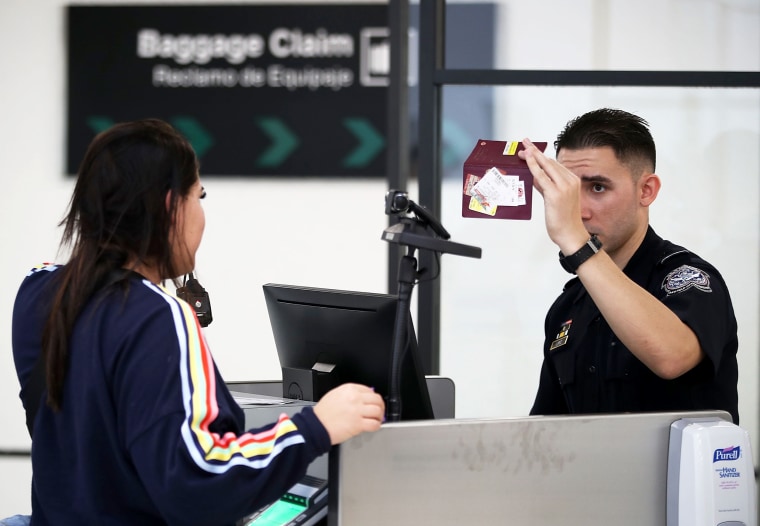WASHINGTON — Israeli citizens have joined an exclusive club that allows visa-free entry to the U.S., a decision that comes despite tensions with Washington over the treatment of Palestinians and divisive domestic policies pursued by the Jewish state’s right-wing government.
The Biden administration has formally accepted the key U.S. ally into its Visa Waiver Program after years of efforts. The decision also means all U.S. citizens will be able to request visa-free entry to Israel as part of that country's reciprocity agreement.
“Israel’s admittance into the Visa Waiver Program is an important achievement in the 75-year-old U.S.-Israel partnership — but to be clear, the decision to admit Israel was taken not as a favor, but because it benefits both U.S. and Israeli interests” an administration official said. “The steps Israel has taken to qualify for VWP will not only increase U.S. border, immigration and counterterrorism security, it will also facilitate legitimate travel and commerce between our countries and our peoples.”
Homeland Security Secretary Alejandro Mayorkas made the designation at the recommendation of Secretary of State Antony Blinken after a trial period to determine whether Israel fully met the program’s strict requirements, particularly reciprocity, given the country’s history of disparate travel experiences facing Palestinian Americans.
The observation period began in mid-July after both countries signed a memorandum of understanding establishing conditions for entry, with Israel facing a deadline of Saturday to comply. A Biden administration official called the results of the effort “impressive” and celebrated the decision as an accomplishment after years of efforts, noting Israel’s participation in the program will also help both countries cooperate on national security, counterterrorism and immigration enforcement.
Palestinian Americans who live in the occupied West Bank and Gaza will also be able to visit Israel visa-free — though some critics are skeptical they will be treated the same as other U.S. travelers moving forward.
Israel has long had different requirements for Palestinian Americans, including denying them entry at Ben Gurion International Airport near Tel Aviv for visits to the West Bank and the Gaza Strip, forcing them to travel through Jordan or Egypt like other Palestinians. Israel in recent months has take action to change those entry requirements, allowing Palestinian Americans to fly in and out of Ben Gurion airport, and has pledged to ease movement for Palestinian Americans traveling in and out of the Hamas-ruled Gaza Strip, The Associated Press reported.
“There are so many problems with this decision,” Yousef Munayyer, head of the Palestine-Israel Program and senior fellow at Arab Center Washington, told the AP. “The reciprocity requirement is clearly still not being met since Israeli policy continues to treat some Americans, specifically Palestinian Americans, differently. The administration however seems committed at the highest levels to overlooking this continued discrimination against American citizens to rush Israel into the program before the deadline.”
Earlier this month, 15 Democratic senators wrote a letter to Blinken to express “serious concerns” about admitting Israel into the travel program, urging Blinken not to rush and instead “verify and certify Israel’s compliance with the reciprocity and equal treatment requirements prior to admission into the Visa Waiver Program.”
An administration official said in response, “We respect and understand the views of Congress, but based on the information we collected we reached a different conclusion regarding the satisfaction of that requirement.”
Israel’s foreign minister anticipated the decision earlier this week, calling it “a diplomatic achievement and good news for all Israeli citizens.”
Citizens of Israel, the 41st country in the program, will be able to travel to the U.S. visa-free by Nov. 30.
The announcement represents a high-profile victory for Israeli Prime Minister Benjamin Netanyahu, whose government has had a fraught relationship with the Biden administration.
They have clashed over Netanyahu's contentious judicial overhaul plan that critics say will make the country less democratic; his far-right government's opposition to Palestinian statehood; its treatment of Palestinians, including its aggressive construction of settlements in the occupied West Bank; the growing violence in the West Bank and Gaza that has been allied with sometimes violent rhetoric from Israeli ministers; and U.S. diplomacy with Iran.
But Washington is also pursuing what would be a landmark deal to normalize relations between Israel and Saudi Arabia, a complex set of talks that face potential obstacles in Congress, as well as from Palestinian supporters.
